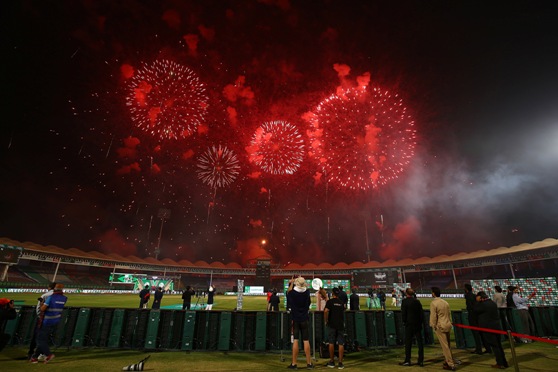LPL can take a cue from success of PSL
By The Line Judge
COLOMBO – The IPL (Indian Premier League) is undeniably the most lucrative T20 league in the world after it was launched in September 2007 by the Board of Control for Cricket in India (BCCI). Hosted in the UAE on a couple of occasions including this season because of the COVID-19 pandemic, the IPL has been the yardstick and trendsetter for other T20 leagues around the world to emulate such as the Big Bash in Australia and T20 Blast in England. Bangladesh’s league has been riddled with corruption while the SLPL (Sri Lanka Premier League) was held for just one season in 2012.
With Sri Lanka Cricket (SLC) all set to launch a rebranded T20 league LPL (Lanka Premier League) in a bio-secure environment in Hambantota next week in the midst of an economic crisis caused by the global viral outbreak, the organizers should draw inspiration from the Pakistan Super League (PSL) which also faced monumental challenges at the outset. After the terrorist attack on the Sri Lanka cricket team bus in Lahore in 2009, there was a virtual ban on international teams travelling to Pakistan. Although the PCB (Pakistan Cricket Board) conceived the idea of launching the PSL in 2013, it became a reality only in 2016 with the participation of five teams after overcoming teething problems. The tournament was hosted in the UAE where their ‘home’ matches were played since the attacks.
The final of the second season was played in Lahore at the Gaddafi Stadium, although many of the foreign stars decided against coming to Pakistan. The third season of the PSL saw a sixth team named Multan Sultans introduced by then PCB chairman Najam Sethi. The season also marked a major step in the revival of cricket in Pakistan as the final three games of the tournament were played in the country. The board managed to bring the two eliminators to Lahore with the final being played in Karachi – the first major international game in the city since the attack on the Sri Lanka team.
Last year, eight games were played in Karachi after 23 games were played in the UAE. The fifth edition of the PSL was the first season all matches were played in Pakistan, although the tournament was cut short and postponed indefinitely due to the coronavirus pandemic before the semi-finals. Nonetheless, it was successfully concluded after an unbeaten half-century by Pakistan captain Babar Azam anchored Karachi Kings to their maiden PSL title defeating Lahore Qalandars by five wickets in the final at the National Stadium in Karachi on Tuesday (17).
The LPL is set to begin on November 26 in a similar vacuum after several delays largely because of health concerns caused by the spike in coronavirus cases in the country. The green light was given after it was agreed to play all 23 matches in a bio-secure bubble at one venue. All the players, match officials and television crew have started the quarantine process though the participation of T20 cricket’s biggest attraction – Christopher Henry Gayle – is in doubt after being bought by Kandy Tuskers. But despite these setbacks, the five-franchise competition received a huge boost when the organizers found a title sponsor My11Circle, a fantasy sports platform in India.
More importantly, the event provides up and coming Sri Lankan players a taste of international cricket. Former Sri Lanka cricket captain Anura Tennekoon and Bandula Warnapura welcomed the LPL as the ideal stepping stone to realizing a long felt need of creating a very strong mainstream national cricket team. “I believe that the staging of the LPL would essentially usher in a new chapter in our cricket,” said Tennekoon.
He was of the opinion that if a country stopped or delayed playing cricket due to the currently prevalent COVID 19 pandemic the standard of cricket was bound to decline. “I believe that Sri Lanka by staging international cricket so that spectators could catch the catch the action by live telecast of the LPL given the current health situation in the country, it would be a new fusion to keeping the game alive,” he said emphasizing that it would be a boon to the national economy and bring commercial gains to players.
Sri Lanka’s first Test captain Warnapura also concurred that the LPL is important for the health of a nation reeling from the viral outbreak. “The LPL will also be a much welcome tonic towards the mental well-being of a nation plagued by health problems of the current COVID 19 pandemic and other domestic problems by getting the opportunity to watch the live telecast or listen to the radio commentaries of the matches,” he said.
“A sportsman should indulge in not just cricket but whatever other sport. Thereby they are nourished both mentally and physically. Particularly for the people who are starved of cricket action due to the current COVID 19 impasse, the staging of the LPL will be a huge welcome tonic,” he added.
Obviously, there is a financial benefit for SLC from the LPL. The rights for the league were sold to IPG in a five-year deal worth US$ 11 million, with SLC receiving US$ 1.9 million in each of the first two years, with 10 per cent increases on that amount every year after that.
The brand value of the IPL in 2019 was US$6.7 billion, according to Duff & Phelps. It has been a runaway success from the first season in 2008. SLC are poor cousins comparatively. But they can take a leaf from PCB who overcame insurmountable odds of staging PSL away from home to host the fifth edition entirely in Pakistan.
– ENCL


